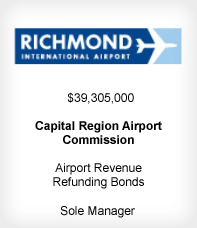Modified Make-Whole Calls
Introducing a new call option for tax-exempt bonds

A new type of call option was introduced into the municipal marketplace earlier this year for use in bonds not eligible for a tax-exempt advance refunding. The modified make-whole call (“MMWC”), as we refer to it in marketing discussions, is a variation on a traditional make-whole call and is intended to offer issuers greater flexibility.
For issuers, the MMWC provides the option to refinance non-advance refundable bonds for savings prior to their first par call date, which is typically 10 years from issuance. Other alternatives for refinancing non-advance refundable bonds, including taxable advance refundings and forward bond sales, are likely to be more expensive than a current refunding using a MMWC.
In a traditional make-whole call, often used in taxable municipal and corporate bonds, the bond’s principal and interest payments to maturity are discounted at the then-current market U.S. Treasury yield for the bond’s maturity plus a fixed spread. The greater of that present value number and par value of bonds called is the make-whole redemption price.
“This is a developing call feature and its real strength is that it provides the issuer a level of flexibility they didn’t have before.”
– D.J. Mehigan, managing director, on applying the modified make-whole call to a recent Capital Region Airport Commission (Richmond International Airport) transaction.
With a modified make-whole call, the tax-exempt bond’s principal and interest payments to the first par call date (not maturity) are discounted at the then-current AAA MMD yield corresponding to the bond’s first par call date. The greater of that present value and 102% of the bond’s amortized value to par call, based on its original yield, is the modified make-whole redemption price.
For investors, the MMWC provides a redemption price comparable to the value of a bond that has been defeased to its first par call date – a pre-refunded bond. In a traditional advance refunding, a cash-matched escrow of U.S. Treasury and other defeasance securities is irrevocably pledged to the repayment of the refunded bonds. Discounting those same cash flows at the AAA MMD yield in the MMWC can offer investors similar economics to a pre-refunded bond. The biggest difference is that with the MMWC, investors receive the redemption value as an immediate payment rather than owning a defeased bond. The exercise of the MMWC should generally result in a redemption price greater than the price at which the bonds would otherwise have been valued. It has been reported that issuers who have sold bonds that have a MMWC have paid no yield penalty for using this redemption feature.

Recently, our team used the MMWC option in a sole managed $39.305 million advance refunding for the Capital Region Airport Commission (Richmond International Airport). “This call feature was something we’ve been seeing more frequently since the beginning of the year and it fit the needs of the airport and the structure of this type of issue,” said managing director and municipal underwriter, Jock Wright. The team took care to educate the issuer, the sales team and investors about this call option, highlighting its suitability in the transaction. Their efforts resulted in a successful refunding and a satisfied client. According to D.J. Mehigan, managing director, “This is a developing call feature, and its real strength is that it provides the issuer a level of flexibility that they didn’t have before.”
A closer look at modified make-whole calls:
For non-advance refundable bonds – The MMWC is useful for increasing the potential savings from future refinancings for bonds subject to the AMT and for Non-AMT bonds that are not eligible for an advance refunding.
Only valuable until the first par call date – The MMWC is structured to be in effect only until the first call date, at which point, the standard 10-year par call is effective.
No additional savings at issuance – The MMWC provides no additional savings when the bonds incorporating this feature are issued in the primary market. The MMWC offers the potential for generating savings in a future refinancing.
Not for use in bonds with material original issue discount – Scenarios can be constructed in which bonds that were originally sold at a deep discount could be redeemed at a MMWC price that is materially below the price at which the bonds might otherwise be trading. We believe this is only likely to occur if the tax-exempt yield curve were to invert. However, to eliminate these low probability events, we recommend the MMWC only be used in bonds that are originally sold at par, at an original issue premium or, in limited circumstances, with a small original issue discount.
Public Finance Market Watch
In-depth and timely commentary and analysis on the municipal market from industry experts.